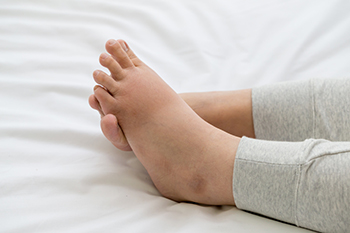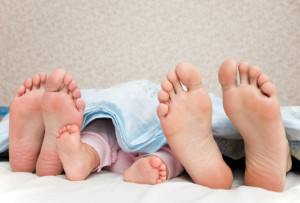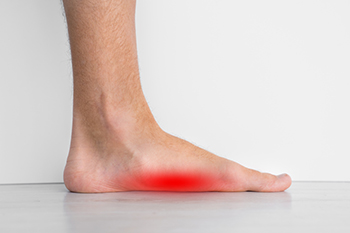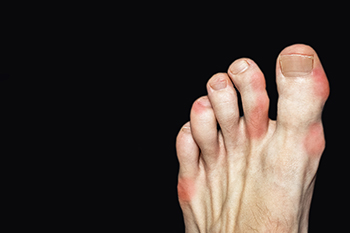
(616) 846-3400
Fax: (616) 846-3406

(616) 846-3400
Fax: (616) 846-3406

Having swollen feet and ankles is common during pregnancy. Some women refer to their swollen ankles as "cankles." The swelling can be quite evident in the third trimester, especially toward the end of the pregnancy. This is because of the increased blood and fluids the body produces while pregnant, which is necessary to support the growing fetus. It is suggested during pregnancy to drink plenty of water daily, avoid crossing your legs, and limit salt intake and time spent in the heat to help mitigate swollen feet and ankles. It is also helpful to elevate the feet, wear comfortable shoes, and engage in a gentle, consistent exercise routine. If you have questions about how your pregnancy can affect your feet, it is suggested that you confer with a podiatrist who can provide you with helpful relief tips.
Pregnant women with swollen feet can be treated with a variety of different methods that are readily available. For more information about other cures for swollen feet during pregnancy, consult with Dr. Robbi Young from Grand Haven Foot & Ankle. Our doctor will attend to all of your foot and ankle needs.
What Foot Problems Can Arise During Pregnancy?
One problem that can occur is overpronation, which occurs when the arch of the foot flattens and tends to roll inward. This can cause pain and discomfort in your heels while you’re walking or even just standing up, trying to support your baby.
Another problem is edema, or swelling in the extremities. This often affects the feet during pregnancy but tends to occur in the later stages.
How Can I Keep My Feet Healthy During Pregnancy?
If you have any questions please feel free to contact our office located in Grand Haven, MI . We offer the newest diagnostic and treatment technologies for all your foot and ankle needs.

If you are caring for a young child, then it is imperative that proper care and attention are given to the health of their feet. One disease that can negatively impact the health of a child’s feet is known as Kawasaki disease. This condition is primarily associated with throat problems and high temperatures in children. However, this disease can also bring about negative symptoms in the feet. Specifically, children who develop Kawasaki disease may notice abnormal symptoms in their feet. These children might have feet that are particularly painful or red, and they might also be somewhat swollen. During the second phase of Kawasaki disease, a child might also demonstrate skin that peels off on the feet. Peeling might also appear on the soles of the feet. Contact a podiatrist today for more information about Kawasaki disease and the feet.
Making sure that your children maintain good foot health is very important as they grow. If you have any questions, contact Dr. Robbi Young of Grand Haven Foot & Ankle. Our doctor can provide the care you need to keep you pain-free and on your feet.
Keeping Children's Feet Healthy
Having healthy feet during childhood can help prevent medical problems later in life, namely in the back and legs. As children grow, their feet require different types of care. Here are some things to consider...
Although babies do not walk yet, it is still very important to take care of their feet.
Avoid putting tight shoes or socks on his or her feet.
Allow the baby to stretch and kick his or her feet to feel comfortable.
As a toddler, kids are now on the move and begin to develop differently. At this age, toddlers are getting a feel for walking, so don’t be alarmed if your toddler is unsteady or ‘walks funny’.
As your child gets older, it is important to teach them how to take care of their feet.
Show them proper hygiene to prevent infections such as fungus.
Be watchful for any pain or injury.
Have all injuries checked by a doctor as soon as possible.
Comfortable, protective shoes should always be worn, especially at play.
If you have any questions please feel free to contact our office located in Grand Haven, MI . We offer the newest diagnostic and treatment technologies for all your foot and ankle needs.

Rigid flat feet are evident by the lack of arch while standing. Some people can see an arch when they’re sitting down which is referred to as flexible flat feet. Both conditions may cause the feet to feel achy, and there are specific stretches that may help to alleviate this. There are small muscles inside the foot that can improve the foot arch, and the short foot exercise may help to strengthen these muscles. This is done by keeping the foot on the floor while sitting in a chair, and sliding the front of the foot along the floor toward the heel. This is most effective when repeated up to ten times and after holding for several seconds. The calf stretch is a popular exercise to perform that may help to strengthen flat feet. This is done by standing against a wall, and extending one leg back until a gentle stretch is felt. If you would like more information about how to improve flat feet, please ask a podiatrist who can provide you with additional stretching techniques.
Flatfoot is a condition many people suffer from. If you have flat feet, contact Dr. Robbi Young from Grand Haven Foot & Ankle. Our doctor will treat your foot and ankle needs.
What Are Flat Feet?
Flatfoot is a condition in which the arch of the foot is depressed and the sole of the foot is almost completely in contact with the ground. About 20-30% of the population generally has flat feet because their arches never formed during growth.
Conditions & Problems:
Having flat feet makes it difficult to run or walk because of the stress placed on the ankles.
Alignment – The general alignment of your legs can be disrupted, because the ankles move inward which can cause major discomfort.
Knees – If you have complications with your knees, flat feet can be a contributor to arthritis in that area.
Symptoms
Treatment
If you are experiencing pain and stress on the foot you may weaken the posterior tibial tendon, which runs around the inside of the ankle.
If you have any questions please feel free to contact our office located in Grand Haven, MI . We offer the newest diagnostic and treatment technologies for all your foot and ankle needs.

People worldwide can develop the painful foot condition that is known as gout. However, research has shown it is more prevalent among men. It is an ailment that happens as a result of excess uric acid levels in the blood, and it can come from the foods that are eaten. These can include red meats, shellfish, and drinks that are made with large amounts of sugar. Additionally, it may happen for genetic reasons, or if there has been an organ transplant. The excess uric acid will form into crystals in the joints of the big toe, and this can cause debilitating pain. Gout attacks may be limited or avoided when healthy lifestyle changes are implemented. These can consist of drinking plenty of water daily and engaging in a gentle exercise program. Additionally, it is beneficial to eat regular servings of fruits and vegetables, and update existing medications that may increase the risk of getting gout. If you suffer from this condition, it is strongly urged that you are under the care of a podiatrist who can help you to manage it.
Gout is a foot condition that requires certain treatment and care. If you are seeking treatment, contact Dr. Robbi Young from Grand Haven Foot & Ankle. Our doctor will treat your foot and ankle needs.
What Is Gout?
Gout is a type of arthritis caused by a buildup of uric acid in the bloodstream. It often develops in the foot, especially the big toe area, although it can manifest in other parts of the body as well. Gout can make walking and standing very painful and is especially common in diabetics and the obese.
People typically get gout because of a poor diet. Genetic predisposition is also a factor. The children of parents who have had gout frequently have a chance of developing it themselves.
Gout can easily be identified by redness and inflammation of the big toe and the surrounding areas of the foot. Other symptoms include extreme fatigue, joint pain, and running high fevers. Sometimes corticosteroid drugs can be prescribed to treat gout, but the best way to combat this disease is to get more exercise and eat a better diet.
If you have any questions please feel free to contact our office located in Grand Haven, MI . We offer the newest diagnostic and treatment technologies for all your foot and ankle needs.